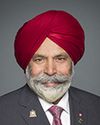Thank you, Chair.
I'm Sheila Malcolmson, member of Parliament for Nanaimo—Ladysmith. We have the sad honour of having had more deaths per capita to drug overdose than anywhere else in British Columbia has, since 2008, so this has been happening for some time.
The B.C. coroner, just last month, said that Vancouver Island Health Authority—just think of this beautiful island paradise, this rural area—has had the largest increase in opioid deaths, a 135% increase from last year, and we have the highest rate of overdose deaths in British Columbia. So I appreciate the work that all of you men and women are doing on the front line and all of the advocacy that you're doing through all of your organizations.
Mr. Emberley, you were quoted last year as saying that this is really a disaster that's happening all across Canada. We're hearing that again and again here. In your view, is the opioid overdose crisis a national emergency?





